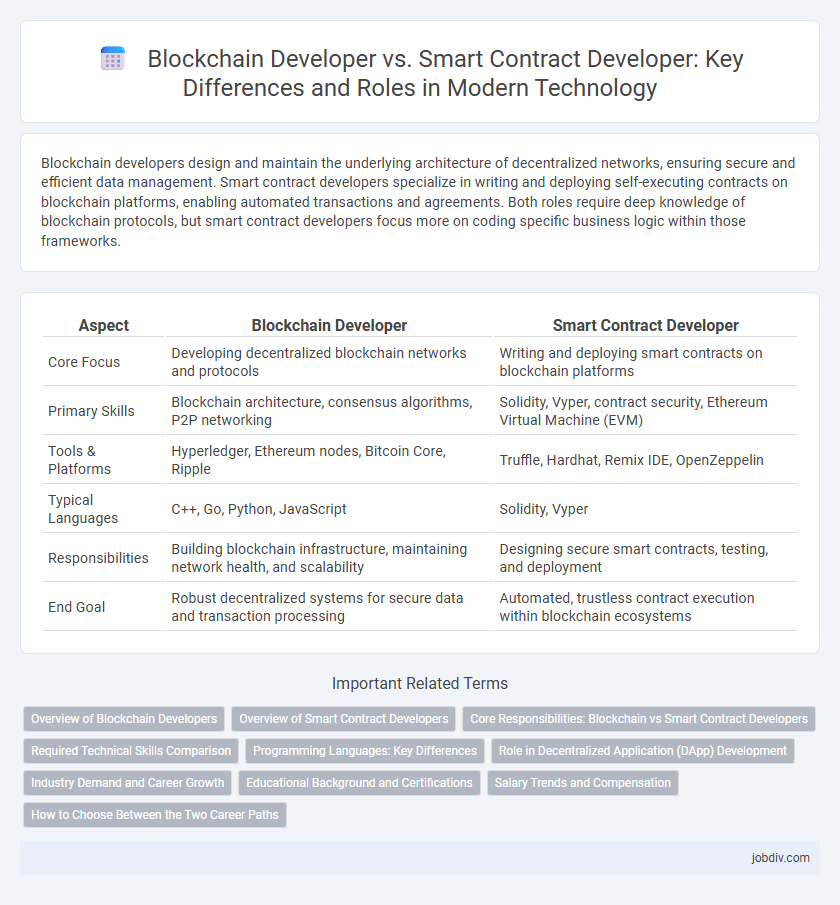Blockchain developers design and maintain the underlying architecture of decentralized networks, ensuring secure and efficient data management. Smart contract developers specialize in writing and deploying self-executing contracts on blockchain platforms, enabling automated transactions and agreements. Both roles require deep knowledge of blockchain protocols, but smart contract developers focus more on coding specific business logic within those frameworks.
Table of Comparison
| Aspect | Blockchain Developer | Smart Contract Developer |
|---|---|---|
| Core Focus | Developing decentralized blockchain networks and protocols | Writing and deploying smart contracts on blockchain platforms |
| Primary Skills | Blockchain architecture, consensus algorithms, P2P networking | Solidity, Vyper, contract security, Ethereum Virtual Machine (EVM) |
| Tools & Platforms | Hyperledger, Ethereum nodes, Bitcoin Core, Ripple | Truffle, Hardhat, Remix IDE, OpenZeppelin |
| Typical Languages | C++, Go, Python, JavaScript | Solidity, Vyper |
| Responsibilities | Building blockchain infrastructure, maintaining network health, and scalability | Designing secure smart contracts, testing, and deployment |
| End Goal | Robust decentralized systems for secure data and transaction processing | Automated, trustless contract execution within blockchain ecosystems |
Overview of Blockchain Developers
Blockchain developers specialize in creating and maintaining decentralized ledger technologies that ensure secure, transparent, and immutable record-keeping. Their expertise spans distributed systems, cryptographic protocols, and consensus algorithms, enabling the development of scalable blockchain platforms. Unlike smart contract developers who focus specifically on writing self-executing code on blockchain networks, blockchain developers handle infrastructure, network architecture, and overall blockchain integration.
Overview of Smart Contract Developers
Smart contract developers specialize in creating automated, self-executing contracts on blockchain platforms such as Ethereum, utilizing languages like Solidity and Vyper. They focus on writing secure, efficient code that enforces agreements without intermediaries, ensuring transparency and immutability in decentralized applications. This role requires deep knowledge of blockchain protocols, cryptographic principles, and rigorous testing to prevent vulnerabilities in smart contracts.
Core Responsibilities: Blockchain vs Smart Contract Developers
Blockchain developers design and maintain the entire blockchain infrastructure, ensuring network security, consensus mechanisms, and decentralized database management. Smart contract developers focus on writing, testing, and deploying self-executing contracts using languages like Solidity, optimizing code for security and efficiency within the blockchain ecosystem. Both roles require deep understanding of cryptographic principles and decentralized systems but differ in their specialization between infrastructure development and application-layer programming.
Required Technical Skills Comparison
Blockchain developers require proficiency in distributed ledger technologies, cryptographic algorithms, consensus protocols, and programming languages like C++, Java, or Python to build and maintain blockchain infrastructure. Smart contract developers must specialize in blockchain-specific languages such as Solidity or Vyper, with in-depth knowledge of Ethereum Virtual Machine (EVM), security best practices, and formal verification techniques to write, test, and deploy secure, self-executing contracts. Both roles demand strong understanding of decentralized architectures, but smart contract development emphasizes secure coding and contract lifecycle management within specific blockchain platforms.
Programming Languages: Key Differences
Blockchain developers primarily utilize languages like C++, Python, and JavaScript to build and maintain decentralized networks and infrastructure, focusing on overall system functionality and security. Smart contract developers specialize in Solidity, Vyper, and Rust for programming self-executing contracts on platforms such as Ethereum and Solana, ensuring precise automation and enforcement of contract terms. The core distinction lies in blockchain developers addressing the underlying network architecture, while smart contract developers concentrate on coding specific agreements within that network.
Role in Decentralized Application (DApp) Development
Blockchain developers architect the underlying infrastructure and protocols that enable secure, transparent, and immutable ledger systems essential for decentralized applications (DApps). Smart contract developers specialize in coding self-executing contracts on blockchain platforms, automating transactions and business logic within DApps to ensure trustless interactions. Together, their roles integrate blockchain architecture with programmable agreements, driving reliable and efficient decentralized ecosystems.
Industry Demand and Career Growth
Blockchain developers are highly sought after for their expertise in creating decentralized applications and maintaining blockchain infrastructure, reflecting the industry's rapid expansion with a projected CAGR of over 67% by 2030. Smart contract developers specialize in coding self-executing contracts primarily on platforms like Ethereum, with demand driven by the rise of DeFi and NFT markets, which are expected to reach a combined valuation exceeding $80 billion by 2025. Career growth in both roles is robust, with smart contract developers often commanding higher salaries due to specialized skills, while blockchain developers benefit from broader opportunities across fintech, supply chain, and healthcare sectors.
Educational Background and Certifications
Blockchain developers typically possess degrees in computer science, software engineering, or information technology, with a strong foundation in cryptography and distributed systems. Smart contract developers often have specialized certifications such as Certified Ethereum Developer or blockchain-specific courses from platforms like ConsenSys Academy or Coursera, emphasizing Solidity programming and contract auditing. Both roles benefit from continuous learning in decentralized application (dApp) development and knowledge of blockchain protocols like Ethereum and Hyperledger.
Salary Trends and Compensation
Blockchain developers command competitive salaries due to their expertise in decentralized ledger technologies, with average annual compensation ranging from $90,000 to $150,000 depending on experience and location. Smart contract developers often earn similarly lucrative salaries, typically between $100,000 and $160,000, reflecting specialized skills in coding Ethereum, Solidity, and other contract languages. Market demand for smart contract developers tends to drive higher pay in fintech and DeFi sectors, while blockchain developers enjoy broader opportunities across supply chain, healthcare, and logistics industries.
How to Choose Between the Two Career Paths
Choosing between a Blockchain Developer and a Smart Contract Developer career path depends on your expertise and interest in core blockchain protocols versus application-specific coding. Blockchain Developers focus on building and maintaining the entire decentralized network infrastructure, while Smart Contract Developers specialize in writing and auditing self-executing contracts on platforms like Ethereum. Evaluating your skills in cryptography, consensus algorithms, and programming languages like Solidity or Go helps determine the best fit for long-term growth in the blockchain ecosystem.
Blockchain Developer vs Smart Contract Developer Infographic

 jobdiv.com
jobdiv.com